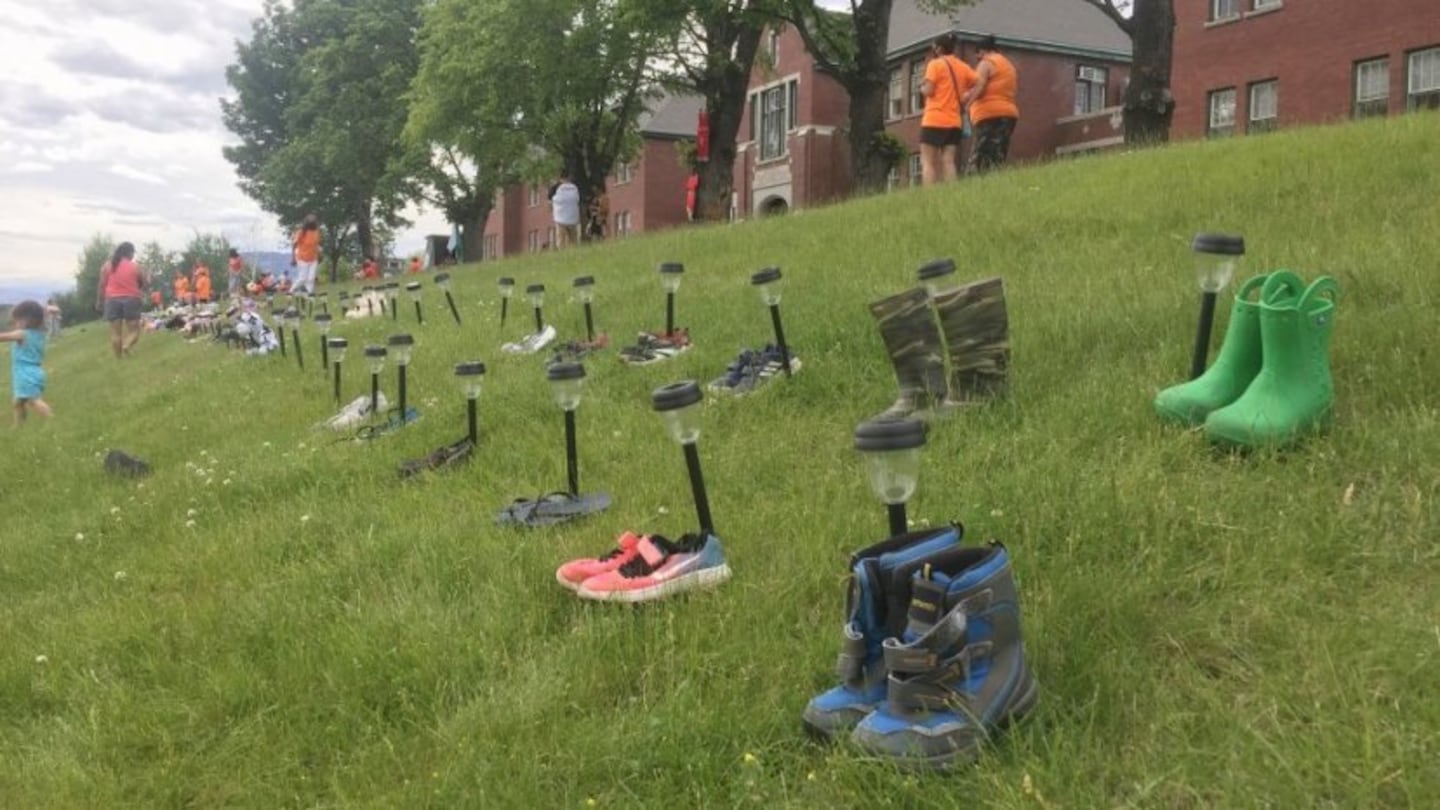Shoes and tributes mark the site where the remains of 215 children were found around a former Indian Residential School in Secwepemc territory in 2021. Photo / Getty Images
Canada marks July 1 every year as Canada Day, a day commemorating the unification of different colonies. However, First Nations peoples in Canada have increasingly sought to boycott the day or abstain from celebrating, pointing to its colonial past and its treatment of Indigenous People. Te Ao Māori News spoke to Indigenous Canadians living in NZ to find out what Canada Day means to them.
Leane Allen grew up in Secwepemc First Nations territory in Western Canada. She says Canada Day is not an occasion of joy.
"It celebrates the beginning of the nation of Canada. But my people were always there on that land," she says.
And the nation that was formed doesn't have a kind history towards her people. "Kua pahua te reo, kua pahua ngā tamariki, kua pahua te ahurea," Allen says.
(We were robbed of our language, our children our culture.)
"Kaore he rā pai māku," she says.
(For me, it's not a good day.")
Leanne Allen came to Aotearoa in 2013 and lived in Whāingaroa. She now lives in Auckland. Photo / Supplied
Carmen Fortin is Cree-Métis from Manitoba. (The word Métis refers to someone with mixed European and Native whakapapa). "It (Canada Day) is supposed to be a day of pride. And I am proud of where I am from. I love the people. However there is a bit of an internal conflict," she says.
It's hard to be proud of First Nations being overrepresented in prisons and missing persons' reports, Fortin says. "Never mind the residential schools that have not been explored."
Mass graves
The "schools" refers to the Indian residential schools that were run from the 1870s to the 1990s. Indigenous children were taken from their families and put into residential schools to assimilate them into mainstream society. In recent years, mass graves have been discovered in some of these establishments, filled with the bodies of children who had been sent to these schools and never returned.
"The first mass graves that were discovered, there were 215 of them, they were discovered in Secwepemc territory, which is my people," Allen says. "That's where we would go every year, where we met for pow wows. Even now I get goosebumps when thinking about it."
"Our children were stolen from our people and they were put in those residential schools. Then they would never come home," she says. "They were not allowed to visit, they were not allowed to return. The parents weren’t allowed to know them."
For Allen, the most dehumanising aspect of these schools was that they were "explicitly designed to remove the Indian from the child. That part of them was seen as sub-human."
In his visit to Canada last year, Catholic Church leader Pope Francis apologised to the survivors of abuse at residential schools. (Most of the schools, funded by the Department of Indian Affairs, were administered by churches) but apologies do not make up for historic injustices to her people, Allen says.
Untaught history
"Yes, those apologies needed to happen," says Allen. "But there’s no acknowledgement of the ongoing effects of colonisation, of stolen children or stolen land."
"My great-grandmother had land taken from her. And there are members of my family who have not had the opportunity to build any wealth," Carmen Fortin says.
Much as in Aotearoa, colonial history is not taught in schools, Allen says. "We grew up learning French and English history back to the gold rush. Not once did we learn about my people. So we grew up thinking we just don't matter.
"Me being here as a Canadian in NZ, Canada Day is about connecting me back to my family. However, there is a bit of an internal conflict," says Carmen Fortin, who lives in Kirikiroa. Photo / Supplied
And it's not history that goes back too far, says Fortin, with the last residential schools closing only in 1996. "In my Facebook feed there are still friends and relatives sharing that a relative is missing, or they have been taken for a "starlight tour", which means that the police have taken them out to the middle of nowhere and dropped them off," she says.
Moving ahead
"A big part of reconciliation is trying to find closure for those families who 'have lost their children," Fortin says. "A lot of families still don't know what happened to those from what would be their grandmothers or their great-grandmothers' generation."
In the present, however, celebrating a day to mark the formation of Canada is difficult.
"It’s asking us to celebrate the people who have destroyed us," Allen says. "It’s asking us to celebrate the loss of our language, our loss of our people, our children, our culture. The loss of our everything. Everything!”
"The idea that we need to celebrate that is just abhorrent," she says.
- Watch below: Muscogee Creek Nation leaders talk about the 4th of July.

